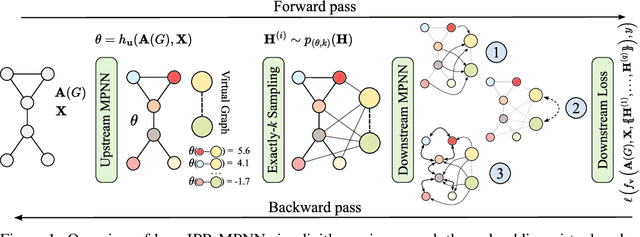Probabilistic Graph Rewiring via Virtual Nodes
Paper and Code
May 27, 2024



Message-passing graph neural networks (MPNNs) have emerged as a powerful paradigm for graph-based machine learning. Despite their effectiveness, MPNNs face challenges such as under-reaching and over-squashing, where limited receptive fields and structural bottlenecks hinder information flow in the graph. While graph transformers hold promise in addressing these issues, their scalability is limited due to quadratic complexity regarding the number of nodes, rendering them impractical for larger graphs. Here, we propose \emph{implicitly rewired message-passing neural networks} (IPR-MPNNs), a novel approach that integrates \emph{implicit} probabilistic graph rewiring into MPNNs. By introducing a small number of virtual nodes, i.e., adding additional nodes to a given graph and connecting them to existing nodes, in a differentiable, end-to-end manner, IPR-MPNNs enable long-distance message propagation, circumventing quadratic complexity. Theoretically, we demonstrate that IPR-MPNNs surpass the expressiveness of traditional MPNNs. Empirically, we validate our approach by showcasing its ability to mitigate under-reaching and over-squashing effects, achieving state-of-the-art performance across multiple graph datasets. Notably, IPR-MPNNs outperform graph transformers while maintaining significantly faster computational efficiency.
 Add to Chrome
Add to Chrome Add to Firefox
Add to Firefox Add to Edge
Add to Edge